History of Olive Oil Soap
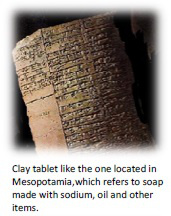
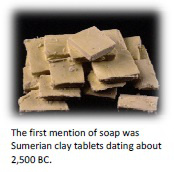 Olive oil has been used in soap making for thousands of years. The first testimonial source made a reference to a soap-like product from 2nd millennium BC, in ancient Mesopotamia. Specifically in the Sumer region clay tablets appeared telling of the mixture consisting in the boiling of oils with alkali, potassium, sodium, resins and salt. This mixture was used mainly to treat the textile fabrics such as wool and skin. Legend has it that the first soap was accidentally produced on a site of animal sacrifice. As the goat meat burned, fat dripped down through the fire, bonding to lye leaching out of the ashes. The combination collected from women used the clay to scrub laundry clean. Soap was known and used in the treatment of wounds and in hair-dressing before its cleansing properties were understood. It was not widely known in Northern and central Europe until the Arab invasion of the Byzantine Empire. The Celts are credited with introducing soap to Britain in 1000 CE. Although the Arabs used animal fat for their soaps, the abundance of olive trees in the Mediterranean area led to the development of soaps based on olive oil and lye from the ashes of the barilla, a common plant.
Olive oil has been used in soap making for thousands of years. The first testimonial source made a reference to a soap-like product from 2nd millennium BC, in ancient Mesopotamia. Specifically in the Sumer region clay tablets appeared telling of the mixture consisting in the boiling of oils with alkali, potassium, sodium, resins and salt. This mixture was used mainly to treat the textile fabrics such as wool and skin. Legend has it that the first soap was accidentally produced on a site of animal sacrifice. As the goat meat burned, fat dripped down through the fire, bonding to lye leaching out of the ashes. The combination collected from women used the clay to scrub laundry clean. Soap was known and used in the treatment of wounds and in hair-dressing before its cleansing properties were understood. It was not widely known in Northern and central Europe until the Arab invasion of the Byzantine Empire. The Celts are credited with introducing soap to Britain in 1000 CE. Although the Arabs used animal fat for their soaps, the abundance of olive trees in the Mediterranean area led to the development of soaps based on olive oil and lye from the ashes of the barilla, a common plant.
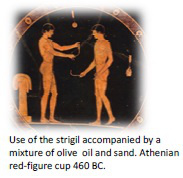 Galen of Pergamon (AD 129 – 199/217) a classical author, names and identifies soap as a product used for washing clothes and personal hygiene. The first olive oil soap factory was established in Marseilles in the 6th century. From the VIII - IX century throughout the Mediterranean basin, and even more focused in the regions of Marseilles, Genoa, Savona and Venice, the soap industry began to flourish. The quality of such soaps was not consistent; it was only in 1792 that the purity and quality of the soap was stabilized, using a process developed.
Galen of Pergamon (AD 129 – 199/217) a classical author, names and identifies soap as a product used for washing clothes and personal hygiene. The first olive oil soap factory was established in Marseilles in the 6th century. From the VIII - IX century throughout the Mediterranean basin, and even more focused in the regions of Marseilles, Genoa, Savona and Venice, the soap industry began to flourish. The quality of such soaps was not consistent; it was only in 1792 that the purity and quality of the soap was stabilized, using a process developed.
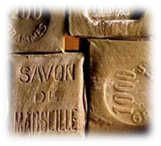 The first olive oil soap factory was established in Marseilles in the 6th century. From the VIII - IX century throughout the Mediterranean basin, and even more focused in the regions of Marseilles, Genoa, Savona and Venice, the soap industry began to flourish. The quality of such soaps was not consistent; it was only in 1792 that the purity and quality of the soap was stabilized, using a process developed. Government of France issued an edict on “Savon de Marseille” (Marseilles soap), ordering that all soap should conform to this manufacturing process. Only soap made in this manner would earn a certification of purity. During the fifteenth century soaps made from olive oil were on the rise, spreading across Europe, becoming the best form of body care. French merchants came to Crete seeking olive oil to supply the soap factories of Marseilles.
The first olive oil soap factory was established in Marseilles in the 6th century. From the VIII - IX century throughout the Mediterranean basin, and even more focused in the regions of Marseilles, Genoa, Savona and Venice, the soap industry began to flourish. The quality of such soaps was not consistent; it was only in 1792 that the purity and quality of the soap was stabilized, using a process developed. Government of France issued an edict on “Savon de Marseille” (Marseilles soap), ordering that all soap should conform to this manufacturing process. Only soap made in this manner would earn a certification of purity. During the fifteenth century soaps made from olive oil were on the rise, spreading across Europe, becoming the best form of body care. French merchants came to Crete seeking olive oil to supply the soap factories of Marseilles.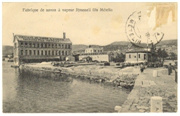 Though soap made from olive oil was known as Marseilles soap, for the better part of two centuries a large section of the olive oil soap industry depended on olive oil from Crete. At the same time, soap making became an important industry in Greece (Crete, Lesvos and Volos) in the 18th and 19th centuries, with major exports of soap from these regions. There were 45 soap factories in Crete, using 2,200,000 okes (more than 2800 tonnes) of olive oil per year. Over the centuries, the process of making soap from olive oil was improved, different oils were mixed with olive oil, and additives – from algae to minerals – were utilized. These soaps were the precursors of today's soaps.
Though soap made from olive oil was known as Marseilles soap, for the better part of two centuries a large section of the olive oil soap industry depended on olive oil from Crete. At the same time, soap making became an important industry in Greece (Crete, Lesvos and Volos) in the 18th and 19th centuries, with major exports of soap from these regions. There were 45 soap factories in Crete, using 2,200,000 okes (more than 2800 tonnes) of olive oil per year. Over the centuries, the process of making soap from olive oil was improved, different oils were mixed with olive oil, and additives – from algae to minerals – were utilized. These soaps were the precursors of today's soaps.




Traditional process of soap making. Mixing and boiling of olive oil ,soda and salt in cauldron and after saponification apply it on floor to dry. One -two days later after soap is solid follows the cutting and stamping of soap, all by hand.
Benefits of use of Olive Oil soap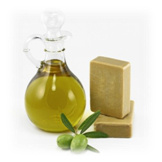 Since 500 B.C., the benefits that olive oil on the body have been widely known. The advantages, however, are not just limited to inside the body. Olive oil soap can also be healthful to the skin. Rich in vitamin E and beta carotene, as well as being an antioxidant, it stimulates new cell generation, slows the progression of wrinkles, and gives skin a youthful look. Extremely mild, it also helps people with a variety of skin conditions. Each soap has a slightly different characteristic, this has to do both with the ingredients and the recipe in use – each oil used will contribute certain qualities to the soap. A soap made from olive oil will has same benefits as the olive oil has. There are many kinds of olive oil soap where we see additives such as animal fat or palm and coconut oil. Your skin can absorb 60% of what you put on it so these kinds of soap can hardly be called olive oil soaps due to the low percentage ( in most cases up to 1 % ) of pure olive oil added to them, therefore can hardly contain any benefit of olive oil.
Since 500 B.C., the benefits that olive oil on the body have been widely known. The advantages, however, are not just limited to inside the body. Olive oil soap can also be healthful to the skin. Rich in vitamin E and beta carotene, as well as being an antioxidant, it stimulates new cell generation, slows the progression of wrinkles, and gives skin a youthful look. Extremely mild, it also helps people with a variety of skin conditions. Each soap has a slightly different characteristic, this has to do both with the ingredients and the recipe in use – each oil used will contribute certain qualities to the soap. A soap made from olive oil will has same benefits as the olive oil has. There are many kinds of olive oil soap where we see additives such as animal fat or palm and coconut oil. Your skin can absorb 60% of what you put on it so these kinds of soap can hardly be called olive oil soaps due to the low percentage ( in most cases up to 1 % ) of pure olive oil added to them, therefore can hardly contain any benefit of olive oil.
Olive oil soap is a time tested recipe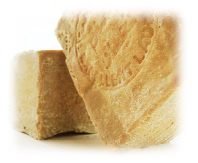 Used for centuries, natural ingredients have powerful healing and renewing properties for beautiful, healthy skin and hair. Today there are a lot of soaps on the market that contain chemicals to make them smell better, make them feel better on your skin and make them look prettier. Years from now, when the laboratory tests are all complete, these unusual chemicals might prove to do more harm than good. But olive oil soap has been in use for centuries. Olive oil soap is a long lasting hard bar, with low lathering ability. Has been considered to be widely used in many countries worldwide due its numerous skin health benefits such as:
Used for centuries, natural ingredients have powerful healing and renewing properties for beautiful, healthy skin and hair. Today there are a lot of soaps on the market that contain chemicals to make them smell better, make them feel better on your skin and make them look prettier. Years from now, when the laboratory tests are all complete, these unusual chemicals might prove to do more harm than good. But olive oil soap has been in use for centuries. Olive oil soap is a long lasting hard bar, with low lathering ability. Has been considered to be widely used in many countries worldwide due its numerous skin health benefits such as:
-Relieving dry skin
-Helps reduce scars and dark spots
-Helps minimize wrinkles
-Easily removes makeup
-Helps prevent common skin disease such as psoriasis, eczema and acne
-Treats skin rashes
Is considered to be the best remedy for dry skin as it helps to exfoliate dead cells and flaky skin. Its moisturizing properties help to soften the skin texture, leaving you with beautiful glowing skin. Another great advantage of using olive oil soap is that it helps in reducing scars and dark spots. Regular use of olive oil soap will help you get rid of those ugly looking marks, making your skin look clean and nourished.
Olive oil soap can be very effective in minimizing wrinkles as it penetrates deep into the skin leaving the skin looking healthier and firmer. Recent research has found out that olive oil contains certain natural properties, oleocanthal, which is known to be a great anti-aging and anti-inflammatory agent. Soaps do not only have hygienic benefits but they were also conceived as ointments dedicated to alleviating aches and pains or to relax the body.
How ''natural'' and ''pure'' is the soap you use for your baby or for your bath?
Always remember to check the ingredients of the soaps and cosmetics you use. By law there should be a mention of all the ingredients which touch the biggest organ of your body, your skin. If you see ingredients like propylene glycol , SLS, mineral oil or parabens maybe it will be wiser to change the brand you use! If you read the ingredients of the soap you use , you may see that major soaps brands still contain "sodium tallowate", which means soap derived from animal fat! Why? Because tallow fat is extremely cheap, because tallow is typically the cheap fat/bone/hide by product leftover from the commercial meat industry. When you use tallow you will also need to use a paraben (preservative) with it. 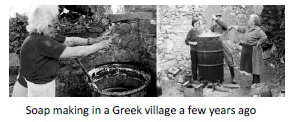 Just think that the soap you use is made from animal fat which fed with Commercial feedlots, with the use antibiotics and hormones. Do you really want to bath your baby or wash your face with this Castille soap was only referred to olive oil based soap made from olives in the region of Castile in Spain. Nowadays it has evolved into meaning pretty much any soap made from mostly vegetable oils. Many castile branded soaps still contains olive oil as one of ingredients maybe just 2-3% of the total and the majority of the soaps made just with animal fat or palm oil.
Just think that the soap you use is made from animal fat which fed with Commercial feedlots, with the use antibiotics and hormones. Do you really want to bath your baby or wash your face with this Castille soap was only referred to olive oil based soap made from olives in the region of Castile in Spain. Nowadays it has evolved into meaning pretty much any soap made from mostly vegetable oils. Many castile branded soaps still contains olive oil as one of ingredients maybe just 2-3% of the total and the majority of the soaps made just with animal fat or palm oil.



